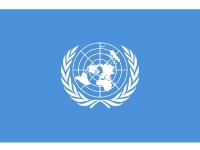Vips
About WOMEN - UN Support For The Rights Of Women
Began w/ Organization s founding Charter

United Nations (Source: United Nations)
USPA NEWS -
UN support for the rights of women began with the Organization's founding Charter. Among the purposes of the UN declared in Article 1 of its Charter is 'To achieve international co-operation“¦ in promoting and encouraging respect for human rights and for fundamental freedoms for all without...
UN support for the rights of women began with the Organization's founding Charter. Among the purposes of the UN declared in Article 1 of its Charter is 'To achieve international co-operation“¦ in promoting and encouraging respect for human rights and for fundamental freedoms for all without as to race, sex, language, or religion.'
Within the UN´s first year, the Economic and Social Council established its Commission on the Status of Women, as the principal global policy-making body dedicated exclusively to gender equality and advancement of women.
Within the UN´s first year, the Economic and Social Council established its Commission on the Status of Women, as the principal global policy-making body dedicated exclusively to gender equality and advancement of women.
Among its earliest accomplishments was ensuring gender neutral language in the draft Universal Declaration of Human Rights.
- WOMEN AND HUMAN RIGHTS
The landmark Declaration, adopted by the General Assembly on 10 December 1948, reaffirms that 'All human beings are born free and equal in dignity and rights“ and that “everyone is entitled to all the rights and freedoms set forth in this Declaration, without distinction of any kind, such as race, colour, sex, language, religion, “¦ birth or other status.'
- WOMEN AND HUMAN RIGHTS
The landmark Declaration, adopted by the General Assembly on 10 December 1948, reaffirms that 'All human beings are born free and equal in dignity and rights“ and that “everyone is entitled to all the rights and freedoms set forth in this Declaration, without distinction of any kind, such as race, colour, sex, language, religion, “¦ birth or other status.'
As the international feminist movement began to gain momentum during the 1970s, the General Assembly declared 1975 as the International Women´s Year and organized the first World Conference on Women, held in Mexico City. At the urging of the Conference, it subsequently declared the years 1976-1985 as the UN Decade for Women, and established a Voluntary Fund for Decade.
In 1979, the General Assembly adopted the Convention on the Elimination of All Forms of Discrimination against Women (CEDAW), which is often described as an International Bill of Rights for Women. In its 30 articles, the Convention explicitly defines discrimination against women and sets up an agenda for national action to end such discrimination.
In 1979, the General Assembly adopted the Convention on the Elimination of All Forms of Discrimination against Women (CEDAW), which is often described as an International Bill of Rights for Women. In its 30 articles, the Convention explicitly defines discrimination against women and sets up an agenda for national action to end such discrimination.
The Convention targets culture and tradition as influential forces shaping gender roles and family relations, and it is the first human rights treaty to affirm the reproductive rights of women.
Five years after the Mexico City conference, a Second World Conference on Women was held in Copenhagen in 1980. The resulting Programme of Action called for stronger national measures to ensure women's ownership and control of property, as well as improvements in women's rights with respect to inheritance, child custody and loss of nationality.
Five years after the Mexico City conference, a Second World Conference on Women was held in Copenhagen in 1980. The resulting Programme of Action called for stronger national measures to ensure women's ownership and control of property, as well as improvements in women's rights with respect to inheritance, child custody and loss of nationality.
- BIRTH OF GLOBAL FEMINISM
In 1985, the World Conference to Review and Appraise the Achievements of the United Nations Decade for Women: Equality, Development and Peace, was held in Nairobi. It was convened at a time when the movement for gender equality had finally gained true global recognition, and 15,000 representatives of non-governmental organizations (NGOs) participated in a parallel NGO Forum.
The event was described by many as 'the birth of global feminism'. Realizing that the goals of the Mexico City Conference had not been adequately met, the 157 participating governments adopted the Nairobi Forward-looking Strategies to the Year 2000. The document broke new ground by declaring all issues to be women´s issues.
In 1985, the World Conference to Review and Appraise the Achievements of the United Nations Decade for Women: Equality, Development and Peace, was held in Nairobi. It was convened at a time when the movement for gender equality had finally gained true global recognition, and 15,000 representatives of non-governmental organizations (NGOs) participated in a parallel NGO Forum.
The event was described by many as 'the birth of global feminism'. Realizing that the goals of the Mexico City Conference had not been adequately met, the 157 participating governments adopted the Nairobi Forward-looking Strategies to the Year 2000. The document broke new ground by declaring all issues to be women´s issues.
- BEIJING CONFERENCEON WOMEN
The Fourth World Conference on Women, held in Beijing in 1995, went a step further than the Nairobi Conference. The Beijing Platform for Action asserted women´s rights as human rights and committed to specific actions to ensure respect for those rights.
-AN ORGANIZATION FOR WOMEN
On 2 July 2010, the United Nations General Assembly unanimously voted to create a single UN body tasked with accelerating progress in achieving gender equality and women´s empowerment.
The Fourth World Conference on Women, held in Beijing in 1995, went a step further than the Nairobi Conference. The Beijing Platform for Action asserted women´s rights as human rights and committed to specific actions to ensure respect for those rights.
-AN ORGANIZATION FOR WOMEN
On 2 July 2010, the United Nations General Assembly unanimously voted to create a single UN body tasked with accelerating progress in achieving gender equality and women´s empowerment.
The new UN Entity for Gender Equality and the Empowerment of Women ““ or UN Women ““ merged four of the world body´s agencies and offices: the UN Development Fund for Women (UNIFEM), the Division for the Advancement of Women (DAW), the Office of the Special Adviser on Gender Issues, and the UN International Research and Training Institute for the Advancement of Women (UN-INSTRAW).
- WOMEN AND THE SUSTAINABLE DEVELOPMENT GOALS
GENDER EQUALITY
- WOMEN AND THE SUSTAINABLE DEVELOPMENT GOALS
GENDER EQUALITY
The United Nations is now focusing its global development work on the recently-developed 17 Sustainable Development Goals (SDGs). Women have a critical role to play in all of the SDGs, with many targets specifically recognizing women´s equality and empowerment as both the objective, and as part of the solution.
Goal 5, to "Achieve gender equality and empower all women and girls" is known as the stand-alone gender goal, because it is dedicated to achieving these ends. Deep legal and legislative changes are needed to ensure women´s rights around the world. While a record 143 countries guaranteed equality between men and women in their Constitutions by 2014, another 52 had not taken this step.
Goal 5, to "Achieve gender equality and empower all women and girls" is known as the stand-alone gender goal, because it is dedicated to achieving these ends. Deep legal and legislative changes are needed to ensure women´s rights around the world. While a record 143 countries guaranteed equality between men and women in their Constitutions by 2014, another 52 had not taken this step.
Stark gender disparities remain in economic and political realms. While there has been some progress over the decades, on average women in the labour market still earn 24 per cent less than men globally. As of August 2015, only 22 per cent of all national parliamentarians were female, a slow rise from 11.3 per cent in 1995.
- COMMISSION ON THE STATUS OF WOMEN
The Commission on the Status of Women (CSW) is the principal global intergovernmental body exclusively dedicated to the promotion of gender equality and the empowerment of women. The CSW is instrumental in promoting women´s rights, documenting the reality of women´s lives throughout the world, and shaping global standards on gender equality and the empowerment of women.
- COMMISSION ON THE STATUS OF WOMEN
The Commission on the Status of Women (CSW) is the principal global intergovernmental body exclusively dedicated to the promotion of gender equality and the empowerment of women. The CSW is instrumental in promoting women´s rights, documenting the reality of women´s lives throughout the world, and shaping global standards on gender equality and the empowerment of women.
- ELIMINATING VIOLENCE AGAINST WOMEN
The UN system continues to give particular attention to the issue of violence against women. The 1993 General Assembly Declaration on the Elimination of Violence against Women contained 'a clear and comprehensive definition of violence against women [and] a clear statement of the rights to be applied to ensure the elimination of violence against women in all its forms'. It represented 'a commitment by States in respect of their responsibilities, and a commitment by the international community at large to the elimination of violence against women'.
The UN system continues to give particular attention to the issue of violence against women. The 1993 General Assembly Declaration on the Elimination of Violence against Women contained 'a clear and comprehensive definition of violence against women [and] a clear statement of the rights to be applied to ensure the elimination of violence against women in all its forms'. It represented 'a commitment by States in respect of their responsibilities, and a commitment by the international community at large to the elimination of violence against women'.
Violence against women is a pandemic affecting all countries, even those that have made laudable progress in other areas. Worldwide, 35 per cent of women have experienced either physical and/or sexual intimate partner violence or non-partner sexual violence.
In February 2008, Mr. Ban Ki-moon launched 'The Secretary-General´s Global Campaign UNiTE to End Violence Against Women'. In opening the multi-year global campaign, he called violence against women an issue that 'cannot wait'.
In February 2008, Mr. Ban Ki-moon launched 'The Secretary-General´s Global Campaign UNiTE to End Violence Against Women'. In opening the multi-year global campaign, he called violence against women an issue that 'cannot wait'.
The International Day for the Elimination of Violence against Women is observed on 25 November.
- WOMEN'S DAY
International Women´s Day is observed annually on 8 March. International Women's Day first emerged from the activities of labour movements at the turn of the twentieth century in North America and across Europe. It is a day, observed by many countries around the world, on which women are recognized for their achievements without regard to divisions, whether national, ethnic, linguistic, cultural, economic or political.
Ruby BIRD
http://www.portfolio.uspa24.com/
Yasmina BEDDOU
http://www.yasmina-beddou.uspa24.com/
- WOMEN'S DAY
International Women´s Day is observed annually on 8 March. International Women's Day first emerged from the activities of labour movements at the turn of the twentieth century in North America and across Europe. It is a day, observed by many countries around the world, on which women are recognized for their achievements without regard to divisions, whether national, ethnic, linguistic, cultural, economic or political.
Ruby BIRD
http://www.portfolio.uspa24.com/
Yasmina BEDDOU
http://www.yasmina-beddou.uspa24.com/
Ruby Bird Yasmina Beddou United Nations Human Rights Economic And Social Council Commission On The Status Of Women
Liability for this article lies with the author, who also holds the copyright. Editorial content from USPA may be quoted on other websites as long as the quote comprises no more than 5% of the entire text, is marked as such and the source is named (via hyperlink).






